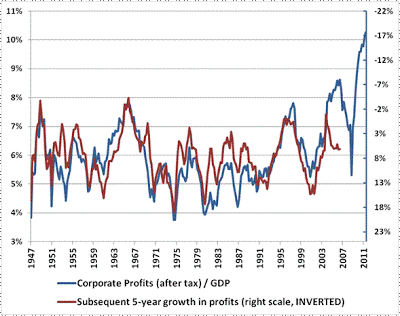Hussman Weekly Market Comment: A False Sense of Security
One of the aspects of the market that is most likely to confuse investors here is the wide range of opinions about valuation, with some analysts arguing that stocks are cheap or fairly valued, and others - including Jeremy Grantham, Albert Edwards, and of course us - arguing that valuations are very rich.
The following chart may help to bridge that gulf. Essentially, analysts who view stocks as "cheap" here are invariably basing that conclusion on current and year-ahead forecasts for earnings. In contrast, analysts who view stocks as richly valued are typically those who view stocks as a claim not on this years' or next years' earnings, but instead are a claim on a long-term stream of deliverable cash flows. Simply put, there is presently a massive difference between short-horizon earnings measures and longer-term, normalized earnings measures.
What's going on here is that profit margins have never been wider in history. But profit margins are also highly cyclical over time. The wide margins at present are partly the result of deficit spending amounting to more than 8% of GDP - where government transfer payments are still holding up nearly 20% of total consumer spending, and partly the result of foreign labor outsourcing (directly, and also indirectly through imported intermediate goods) which has held down wage and salary payouts. Indeed, the ratio of corporate profits to GDP is now close to 70% above its long-term norm.
Now, if you look at the red line (right scale, inverted), you'll notice that unusually high profit shares are invariably correlated with unusually low growth in corporate profits over the following 5-year period. Thanks to continuing deficits and extraordinary monetary interventions, this effect has been largely postponed in recent years, allowing profits to expand to present extremes. We are not arguing that profit margins necessarily have to decline over the near-term, and our concerns don't rest on the assumption that they will. It is sufficient to recognize that the bulk of the value of any stock is not in the early years of earnings, but in the long tail of future cash flows - especially if payouts are low. Stocks are essentially 50-year instruments here in terms of the cash flows that are relevant to their valuation. There are a lot of factors and quiet math that affect the P/E multiple that can be appropriately applied to earnings. Slapping an arbitrary multiple onto elevated earnings reflecting extraordinarily inflated profit margins ignores all of it.

- Hussman Weekly Market Comment: Exit Strategy
Link to: Exit Strategy The S&P 500 set a marginal new high on Friday, in the context of a broad rollover in momentum thus far this year that we view as likely – though of course not certain – to represent a broad cyclical peak of the sort that...
- Hussman Weekly Market Comment: Do Foreign Profits Explain Elevated Profit Margins? No.
Link to: Do Foreign Profits Explain Elevated Profit Margins? No.The bottom line is simple. Corporate after-tax profits as a share of GDP, GNP (or even net national product if one wishes to use that number) are steeply above historical norms. This fact...
- Hussman Weekly Market Comment: Begging For Trouble
With the daily focus on European crisis and the hope of central bank intervention, one of the essential features of the investment climate – at least for long-term investors – is easy to lose in the shuffle. That feature is valuation. It’s an easy...
- Hussman Weekly Market Comment: Run, Don't Walk
Wall Street continues to focus on the idea that stocks are "cheap" on the basis of forward price/earnings multiples. I can't emphasize enough how badly standard P/E metrics are being distorted by record (but reliably cyclical) profit margins, which...
- Hussman Weekly Market Comment: Valuing The S&p 500 Using Forward Operating Earnings
It is impossible to properly estimate long-term cash flows based on a single year of earnings, regardless of whether one uses actual net earnings or projected operating earnings. It is impossible to properly value the stock market based on a single year...

